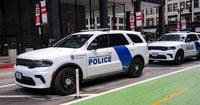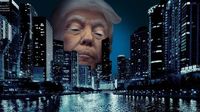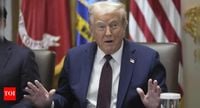The political and social landscape in Chicago has been thrown into sharp relief following President Donald Trump’s recent threats to deploy National Guard troops in the city—a move that has drawn fierce opposition from Illinois Governor JB Pritzker, Chicago Mayor Brandon Johnson, and a coalition of Democratic governors across the country. The ongoing standoff, which has played out both in government offices and across social media, underscores deep divisions over crime, federal authority, and the role of the military in domestic affairs.
It all began to escalate on Monday, August 25, 2025, when President Trump publicly mused about sending the National Guard into Chicago, arguing that the city’s crime problem had spun out of control. During a Cabinet meeting the following day, Trump doubled down, stating, “I just know how to stop crime,” and criticizing Governor Pritzker directly. According to Axios, Trump remarked, “You would think that Illinois would have such a problem with crime, such a bad governor, he should be calling me and he should be saying, ‘Could you send over the troops? Please, it’s out of control.’”
Governor Pritzker, standing firm against what he described as federal overreach, responded with a clear and forceful message. At a press conference surrounded by state and local Democratic leaders, Pritzker declared, “Mr. President, do not come to Chicago. You are neither wanted here nor needed here.” He went further, calling the proposed deployment “exactly the type of overreach that our country’s founders warned against,” and labeling it “illegal, unconstitutional, and un-American,” as reported by Nexstar Media.
Pritzker’s resistance was echoed by Mayor Brandon Johnson, who, like Pritzker, pointed to recent data showing that violent crime in Chicago has actually declined. According to the Associated Press, city data reveals that violent crime dropped by more than 22% in the first half of 2025 compared to the same period in 2024. Yet, Chicago still recorded 573 homicides in 2024—the highest among U.S. cities—providing ammunition for Trump’s repeated characterization of Chicago as a “war zone.”
As the debate intensified, the Pentagon was reported by The Washington Post to be planning a possible military deployment to Chicago, with options including sending several thousand National Guard members as soon as September. However, Pritzker noted that no one from the Trump administration had contacted state officials to coordinate any joint law enforcement response. “If this was really about fighting crime and making the streets safe, what possible justification could the White House have for planning such an exceptional action without any conversations or consultations with the governor, the mayor or the police?” Pritzker asked rhetorically during his press conference. He concluded, “This is not about fighting crime. This is about Donald Trump searching for any justification to deploy the military in a blue city in a blue state to try to intimidate his political rivals.”
The controversy quickly expanded beyond Illinois. On Thursday, August 28, 2025, nineteen Democratic governors—representing nearly every Democratic-led state except Arizona, Connecticut, Hawaii, and Minnesota—issued a joint statement denouncing Trump’s threat. As reported by The New York Times, the governors wrote, “Whether it’s Illinois, Maryland and New York or another state tomorrow, the president’s threats and efforts to deploy a state’s National Guard without the request and consent of that state’s governor is an alarming abuse of power, ineffective, and undermines the mission of our service members.” They accused Trump of politicizing the military and undermining the executive authority of governors as commanders in chief of their state’s National Guard. “This chaotic federal interference in our states’ National Guard must come to an end,” the statement concluded.
According to the Associated Press, the Department of Homeland Security had also approached Naval Station Great Lakes, north of Chicago, for logistical support in immigration operations, fueling speculation that Chicago could be the next city to see troop deployment. Local leaders, including Mayor Johnson and Governor Pritzker, said they were not consulted about these plans and have vowed to resist, with city officials preparing for potential legal action.
Chicago Police Superintendent Larry Snelling urged for clearer communication from federal authorities to avoid panic. “We don’t want to create chaos on our streets,” he cautioned, reflecting concerns about the potential for confusion and unrest if troops were deployed without coordination.
The pushback from state and local leaders has been matched by a groundswell of public reaction. On social media, Trump’s threats have ignited a “love/hate battle” over Chicago’s image, as Axios described it. Pritzker himself posted a video showing runners and walkers enjoying a sunny day along Lake Michigan, sarcastically countering Trump’s “hell-hole” characterization. “Doesn’t feel like a hellhole. In fact, everybody’s having a great time,” he remarked in the video. Supporters and detractors alike have taken to platforms like X (formerly Twitter) to share their views, with some highlighting crime in specific neighborhoods and others showcasing vibrant community life and resilience.
Amid the heated rhetoric, former President Barack Obama weighed in, warning on X that the erosion of due process and the use of troops on American soil “puts the liberties of all Americans at risk.” Pete Buttigieg, the current U.S. transportation secretary, also criticized the idea, noting that Naval Station Great Lakes was never intended for surveillance or enforcement against citizens.
Despite the focus on crime, Chicago’s leaders have pointed to broader trends that complicate the narrative. According to state officials, tourism in Chicago surged in 2024, with 113 million domestic and international visitors spending a record $48.5 billion—up from the previous year. This, they argue, is hardly the sign of a city in crisis.
Governor Pritzker has not minced words in accusing Trump of pursuing a political agenda ahead of the 2026 elections. “This is a part of his plan to do something really nefarious, which is to interfere with elections,” Pritzker said, as quoted by the Associated Press. The governor’s stance has drawn both praise and criticism, with some viewing his resistance as a principled defense of state authority and others accusing him of downplaying the city’s challenges.
For now, the prospect of National Guard troops patrolling Chicago’s streets remains a looming possibility, with the Pentagon reportedly weighing several options and city officials preparing for legal and political battles. As the situation unfolds, the city finds itself at the center of a national debate over federal power, local control, and the very meaning of public safety in America’s urban centers.
In the midst of political brinkmanship and heated exchanges, Chicago’s leaders and residents continue to insist that their city is more than the sum of its challenges—resilient, diverse, and determined to chart its own course, no matter who’s watching from Washington.



